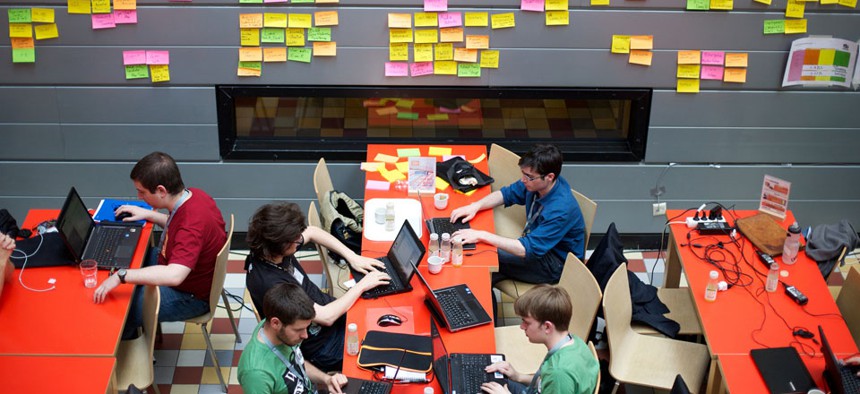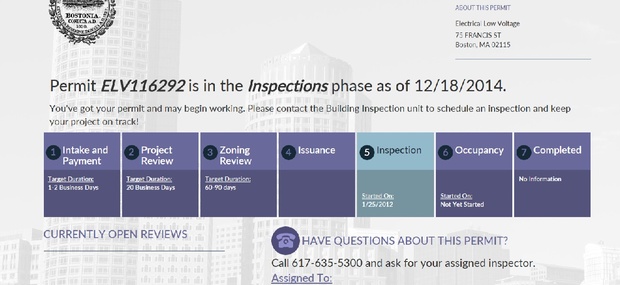Should Cities Give Hackathons Another Look to Improve Digital Infrastructure?

Wikimedia's annual development community meet-up — the Wikimedia Hackathon — was held in Amsterdam, Netherlands in 2013. Flickr user Sebastiaan ter Burg
A 36-hour coding session in Boston recently helped revamp the city's permit system.
As fast as they fell in love with them, cities have begun to dump hackathons.
The rapid-fire coding events generated big buzz over the past few years from municipalities looking for new ways to modernize their technology infrastructure. When it became clear that the events did not produce the overnight results many hoped for, even CityLab wondered, " Are Civic Hackathons Stupid? " At the time, a former chief technical officer of Seattle claimed that they were actually "becoming counterproductive" tools for municipalities.
New software developed during an August event in Boston, however, might cause cities to give hackathons another look. Crafted during a 36-hour coding crunch, the online data system Permit Finder has completely reformed the way Boston processes its hundreds of thousands of permit applications.
Launched on December 11, Permit Finder allows Bostonians to monitor the processing of their permit applications in real time—sort of like that Domino's Pizza app , except for building permits. Previously, according to a city official, Boston residents were largely in the dark about how their permit was being finalized. City hall didn't employ staff that specifically addressed permit inquiries, which made the system seem disorganized and impersonal.
"The fundamental challenge for permitting wasn’t that we couldn’t issue permits," explains Boston CIO, Jascha Franklin-Hodge, "but with respect to our [residents], the process was unpleasant and too slow."

Now, because of Permit Finder, an applicant simply goes to the new website , plugs in their application number, and instantly sees where the application is in the seven-step process. According to the mayor's office , Boston handles nearly 100,000 permit applications annually; Permit Finder will likely reduce much of the red tape that bound up the old system. And creating a more transparent permit system was actually a high priority for the city: Marty Walsh, Boston's new mayor, made reference to it during his inauguration speech in January.
So, if hackathons have passed their civic heyday, how did one reform the permit system of New England's largest city?
According to those involved, it was the specificity of the hackathon that ultimately made it successful. Rather than floating lofty ideals for coders to explore, Boston officials were blunt in their explanation of what they hoped to achieve. Before any coding even started, the city issued four distinct challenges it wanted hackathoners to address, one of which was that "residents need a clear way to track all permits associated with their project." Qlarion , a Virginia-based development company, came up with software that best addressed this challenge. And that software ultimately evolved into Permit Finder.
"I think [Boston officials] came in with focus and structure and an intended outcome," Adam Roy, vice president of operations for Qlarion, told CityLab.
City governments should undoubtedly inform their tech communities of the explicit challenges it wants them to address. Unfortunately, precise objectives are surprisingly absent from many government-run hackathons.
The annual National Day of Civic Hacking , a nationwide hackathon event promoted by the White House , has, "no overarching theme," according to the Guardian , "other than localism, innovation, and a healthy dose of civil power." Similarly, the Seoul City Government recently announced plans to host their first government-sanctioned hackathon this summer. But the parameters of the event seem rather opaque: "Just bring creativity and an open mind!" the event's website enthusiastically says . Vague intentions make for easy criticism—and poor results.
Writing in the Harvard Business Review in 2013, Jake Porway, executive director of DataKind , claimed that "hackathons are not ideal for solving big problems," partly because they "lack clear problem definitions." When government-run hackathons include specificity and a long-term strategy, on the other hand, Porway says the coding events can potentially address certain civic challenges.
"[T]wo important things to make a short-term engagement like a hackathon useful," Porway told CityLab, "are to spend a lot of time up front scoping the problems and to build sustainability into the process."
This combination of precise problem solving and long-term investment is what made the Boston hackathon a major success (the mayor's office is already planning to host another one). The city laid out a definitive issue for its hackathon participants to solve. Then, once the software for Permit Finder was developed, public officials committed to finalizing the project. Four months later, Boston residents have a major upgrade in the way they monitor their permit applications—and the city's mayor followed through on a campaign promise.
Not a bad return for 36 hours of hacking.
NEXT STORY: Sober about cyber


